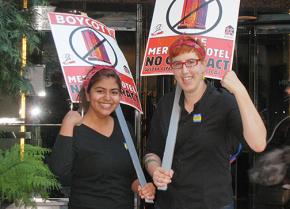Rosie still wants respect
, a delegate to the San Francisco Labor Council, reports on a UNITE HERE organizing campaign for union rights at a downtown hotel.
AMID ALL the bustling and hustling of rush-hour traffic in the center of San Francisco's financial district, several dozen UNITE-HERE Local 2 protesters began picketing one of the city's premier luxury accommodations, the Paris-themed Le Meridien Hotel.
Only a few days before Halloween, several picketers dressed to invoke the iconic image of Rosie the Riveter. Blue-collared shirts, blue jeans and red bandanas were on full display. And they were passing out holiday candy along with their leaflets.
The protest coincided with a cocktail reception at the hotel hosted by the Financial Women of San Francisco.
Thus, the appearance of one, two, three, many Rosies, making a personal appeal to very successful women luxuriating in the plush suites above the street din to look out for their hard-working sisters on the lower floors.
The hotel has been the target of protests since 2009 when employees made the difficult decision of calling for a consumer boycott of the very hotel that employs them.
The year before the boycott was announced, management rejected employee petitions calling for management to remain neutral during a voting process where workers would submit a card indicating their choice for or against union representation. Cards would be reviewed and counted by a neutral mediator, and the results would be final.

These are commonly referred to as "card-check" neutrality agreements. They have been adopted by most of the area's major hotels such as the Sheraton Palace, Omni, W, Fairmont, St. Regis, Four Seasons, Hilton, Intercontinental, Marriot and the Holiday Inn Fisherman's Wharf.
Local 2 even obtained Hyatt Hotels' pledge to honor "card-check" for new hotels built in the region.
This is no small point. Traditional union elections handled by the National Labor Relations Board (NLRB) have become a nightmare plagued by employer interference. Employers easily discover the leanings of individual workers in long organizing campaigns and can, therefore, more easily set up pro-union activists for victimization.
Rep. George Miller (D-Calif.), former chairman of the U.S. House Committee on Education and Labor, described the limitations of traditional NLRB elections: "The current process of forming unions is badly broken. Although it is illegal, one-quarter of employers facing an organizing drive have been found to fire at least one worker who supports a union [and they also] resort to spying, threats, intimidation, harassment and other illegal activity in their campaigns to oppose unions."
These facts are not commonly understood. But Local 2 and the San Francisco Labor Council launched a big educational campaign explaining how "card-check" allows for a more immediate and direct polling of workers without employers looking over their shoulder.
Once this was understood, Le Meridien employees began receiving broad community support.
In fact, the San Francisco Board of Supervisors instructed all city departments in 2010 to boycott Le Meridien and its sister hotel, the Hyatt Fisherman's Wharf, until a "card-check" agreement is reached. We are still waiting.
Both hotels are now owned by the Chesapeake Lodging Trust (which franchises the brand names). And herein is part of the problem in getting an agreement--owners come and go.
HOSPITALITY FRANCHISES are currently major magnets for investor conglomerates. As part of this high-stakes chess game, it's not unusual for hotels to be sold every six or seven years. "This is the fourth owner of Le Meridien in 15 years," Local 2 research director Ian Lewis told me.
It's true. Chesapeake is a relatively new investment group. It purchased Le Meridien's 360 rooms in 2010 for a whopping $397,000 per key. With these high stakes, it makes sense that they look at the hotel "as a real-estate asset above all else," Lewis explained.
As a result, investors like Chesapeake often make grand and attractive capital improvements in their buildings that immediately increase the "property value," but invest less in service improvements that increase the "guest experience," something not calculated or quantified by company accountants.
At Chesapeake's Le Meridian and Hyatt Fisherman's Wharf hotels, employees have openly complained about rushing to perform multiple jobs while trying to deliver good service to guests.
Of course, management invests even less in benefits for employees.
"I needed surgery," 15-year Le Meridien server Edwin Lopez complained, "but the company's health insurance copayment was too expensive so I had to get it done in El Salvador."
Not unlike other detached owners of our day, it becomes difficult to get their attention unless it affects their bottom line.
Since Le Meridien makes special efforts to attract businesswomen and since a majority of hotel employees--especially room cleaners--are also women, Rosie decided to make a personal appearance to address the particular issues of women hotel workers.
Rosie knows from the experience of 8 million women entering the workforce during the Second World War that women should not take their rights for granted. Performing the same jobs as men, they were usually paid half, and when the war ended, despite a poll registering their majority desire to stay, they were sent back home. Women voices were silenced.
Now some 70 years later, Rosie's appeal hopefully convinced some of the influential women clientele of Le Meridien to not abandon their sisters and their fellow workers who only want the chance to be heard.


